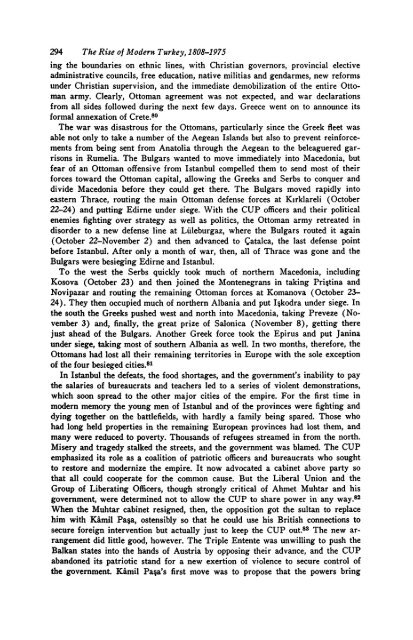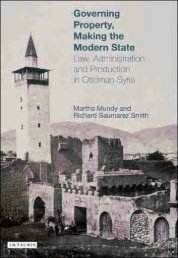The Young Turk Period, 1908-1918 - PSI424
The Young Turk Period, 1908-1918 - PSI424
The Young Turk Period, 1908-1918 - PSI424
Create successful ePaper yourself
Turn your PDF publications into a flip-book with our unique Google optimized e-Paper software.
294 <strong>The</strong> Rise of Modern <strong>Turk</strong>ey, 1808-1975<br />
ing the boundaries on ethnic lines, with Christian governors, provincial elective<br />
administrative councils, free education, native militias and gendarmes, new reforms<br />
under Christian supervision, and the immediate demobilization of the entire Ottoman<br />
army. Clearly, Ottoman agreement was not expected, and war declarations<br />
from all sides followed during the next few days. Greece went on to announce its<br />
formal annexation of Crete. 80<br />
<strong>The</strong> war was disastrous for the Ottomans, particularly since the Greek fleet was<br />
able not only to take a number of the Aegean Islands but also to prevent reinforcements<br />
from being sent from Anatolia through the Aegean to the beleaguered garrisons<br />
in Rumelia. <strong>The</strong> Bulgars wanted to move immediately into Macedonia, but<br />
fear of an Ottoman offensive from Istanbul compelled them to send most of their<br />
forces toward the Ottoman capital, allowing the Greeks and Serbs to conquer and<br />
divide Macedonia before they could get there. <strong>The</strong> Bulgars moved rapidly into<br />
eastern Thrace, routing the main Ottoman defense forces at Kirklareli (October<br />
22-24) and putting Edirne under siege. With the CUP officers and their political<br />
enemies fighting over strategy as well as politics, the Ottoman army retreated in<br />
disorder to a new defense line at Liileburgaz, where the Bulgars routed it again<br />
(October 22-November 2) and then advanced to Catalca, the last defense point<br />
before Istanbul. After only a month of war, then, all of Thrace was gone and the<br />
Bulgars were besieging Edirne and Istanbul.<br />
To the west the Serbs quickly took much of northern Macedonia, including<br />
Kosova (October 23) and then joined the Montenegrans in taking Pri§tina and<br />
Novipazar and routing the remaining Ottoman forces at Komanova (October 23-<br />
24). <strong>The</strong>y then occupied much of northern Albania and put I§kodra under siege. In<br />
the south the Greeks pushed west and north into Macedonia, taking Preveze (November<br />
3) and, finally, the great prize of Salonica (November 8), getting there<br />
just ahead of the Bulgars. Another Greek force took the Epirus and put Janina<br />
under siege, taking most of southern Albania as well. In two months, therefore, the<br />
Ottomans had lost all their remaining territories in Europe with the sole exception<br />
of the four besieged cities. 81<br />
In Istanbul the defeats, the food shortages, and the government's inability to pay<br />
the salaries of bureaucrats and teachers led to a series of violent demonstrations,<br />
which soon spread to the other major cities of the empire. For the first time in<br />
modern memory the young men of Istanbul and of the provinces were fighting and<br />
dying together on the battlefields, with hardly a family being spared. Those who<br />
had long held properties in the remaining European provinces had lost them, and<br />
many were reduced to poverty. Thousands of refugees streamed in from the north.<br />
Misery and tragedy stalked the streets, and the government was blamed. <strong>The</strong> CUP<br />
emphasized its role as a coalition of patriotic officers and bureaucrats who sought<br />
to restore and modernize the empire. It now advocated a cabinet above party so<br />
that all could cooperate for the common cause. But the Liberal Union and the<br />
Group of Liberating Officers, though strongly critical of Ahmet Muhtar and his<br />
government, were determined not to allow the CUP to share power in any way. 82<br />
When the Muhtar cabinet resigned, then, the opposition got the sultan to replace<br />
him with Kamil Pa§a, ostensibly so that he could use his British connections to<br />
secure foreign intervention but actually just to keep the CUP out. 83 <strong>The</strong> new arrangement<br />
did little good, however. <strong>The</strong> Triple Entente was unwilling to push the<br />
Balkan states into the hands of Austria by opposing their advance, and the CUP<br />
abandoned its patriotic stand for a new exertion of violence to secure control of<br />
the government. Kamil Pa§a's first move was to propose that the powers bring












